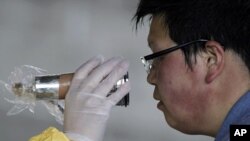U.S. health experts monitoring Japan's nuclear crisis are seeking to explain health risks from radiation exposure, while cautioning that radiation levels measured this week at the Fukushima-Daiichi power plant in northern Japan have not yet reached a critical level.
The publication Scientific American this week quoted Susan Langhorst, the chief radiation officer at Washington University, as saying acute radiation sickness normally sets in after a full-body dose of radiation 3,000 times greater than the recommended annual safe dose.
The Japanese government says levels recorded Tuesday at the Fukushima plant were 20 times higher than the annual limit for nuclear industry employees.
The U.S. Centers for Disease Control and Prevention says first symptoms of radiation sickness, which normally include nausea, vomiting, rashes and diarrhea, can appear within minutes or days of exposure. The CDC says a period of serious illness - including appetite loss, fatigue, fever and gastrointestinal problems may follow and last from hours to months.
CDC and Environmental Protection Agency scientists say acute poisoning can be treated with potassium iodide to block radioactive iodine from being absorbed into the thyroid gland. It can not protect other parts of the body, and can not reverse thyroid damage that has already occurred.
Health Experts Detail Radiation Symptoms












